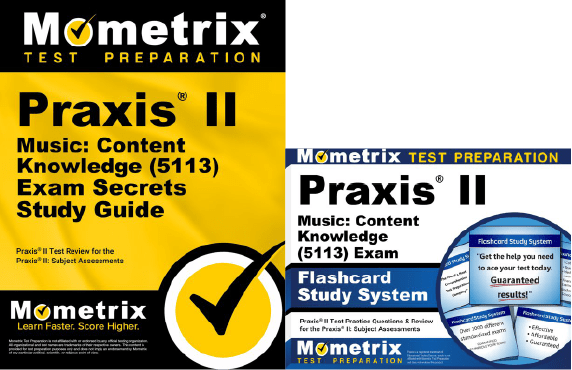If you need help studying for the Praxis® Music: Content Knowledge test or just want some more information about what the test is like, you’ve come to the right place!
Click below to take a free Praxis Music practice test!
What’s on the Exam?
First, let’s talk about the questions on the Praxis Music: Content Knowledge test. There are 120 selected-response questions in total, and the time limit for the test is 2 hours.
Selected-response questions can appear in several different forms:
- Single-selection multiple-choice
- Selecting ALL correct answers from a list of choices
- Selecting the correct answer from a drop-down menu
- Clicking parts of a graphic such as a map or a chart
- Dragging and dropping answers into a targeted area on the screen
The test is split into a listening section (L) and a non-listening section (NL). You’ll take the listening section first, which requires you to listen to some recorded musical excerpts. Then, you’ll move on to the non-listening section.
The questions are grouped into four content categories:
1. Music History and Literature (18 questions)
L 9 questions NL 9 questions
- The history of major developments in musical style
- Significant characteristics of important musical styles and historical periods
- The style of various world musics
- The function of world musics in the culture of origin
2. Theory and Composition (19 questions)
L 9 questions NL 10 questions
- Pitch organization
- Harmony
- Theme and melody
- Rhythm, tempo, and meter
- Form and structure
- Texture
- Dynamics
- Timbre
3. Performance (27 questions)
L 12 questions NL 15 questions
- Identifying errors in pitch, rhythm, intonation, and balance/blend
- Basic conducting techniques
- Notation interpretation
- Expressive elements for performance
- Basic accompaniment techniques
4. Pedagogy, Professional Issues, and Technology (56 questions)
L 0 questions NL 56 questions
- Instructional strategies
- Incorporation of local, state, and national standards
- Classroom management techniques
- Planning and differentiating instruction
- Modifying instruction to accommodate student needs
- Selecting appropriate repertoire for the classroom and for performance
- Teaching vocal production
- Instrumental techniques
- Organization and preparation of concert programming
- Promoting care and maintenance of instruments and materials
- Sight reading
- Basic composition, arranging, and improvisation techniques
- Teaching various musical concepts through performance literature
- Professional issues
- Understanding current technologies used for performance and recording
- Ethical and safe uses for music software
How to Register
To register for the test, you’ll need to create an account on the ETS website. Once your account has been created, you can submit your application to take the test.
Praxis Scores
The Praxis Music: Content Knowledge test is scored using a scaled scoring method. Here’s how it works:
For every question you answer correctly, you get one point added to your raw score. At the end of the test, your final raw score will be converted to a scaled score. This scaled score will range somewhere between 100 and 200.
The reason your raw score is converted to a scaled score is because everyone that takes the test is given a slightly different set of questions. Since everyone has a different arrangement of questions, and because some questions are harder than others, converting your raw score to a scaled score ensures a more even playing field.
Receiving Your Score
When you receive your skill report, it will tell you how many questions you missed in each section and generally whether you passed or not.
Your scores will become available on your Praxis account on the score reporting date. When you get the score back depends on the testing date.
FAQs
How many questions are on the Praxis Music: Content Knowledge test?
The test contains 120 questions.
What is the time limit for the Praxis Music: Content Knowledge test?
The test is timed at 2 hours.
What is the passing score for the Praxis Music: Content Knowledge test?
The passing score varies from state to state.
How much does the Praxis Music: Content Knowledge test cost?
The testing fee is $130.
Praxis is a registered trademark of Educational Testing Service, which is not affiliated with Mometrix Test Preparation and does not endorse this page.



 Praxis Study Guide
Praxis Study Guide Praxis Flashcards
Praxis Flashcards